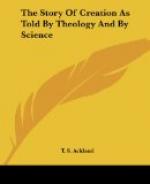But for this purpose it is of little importance to us whether Creation is described as taking place in a moment, or in six ordinary days. If the division into six days indicates orderly progress and watchful care, we naturally expect to find the same indications in each of the subordinate parts. To our imperfect conceptions each single day’s work would bear that same character of vast instantaneous action which seemed so undesirable. It would not help us to realize what it is so important that we should thoroughly feel. The very fact then that the history of Creation is divided into days carries with it a strong presumption that those days are not ordinary days.
In the 14th and following verses, when Moses is describing the formation of the heavenly luminaries, he is particular in mentioning that one part of their office was to “rule over the day and over the night, and to divide the light from the darkness.” Hence it is sometimes inferred that he was under a mistake in speaking of day and night at an earlier period. But such a mistake seems incredible. To suppose that Moses did not perceive that what he wrote in the 14th and following verses was incompatible with what he had written in the 4th and 5th verses, if such an incompatibility really existed, is to impute to him an amount of ignorance or carelessness which is at variance with the whole character of his writings from beginning to end. Instead of this it will be shown hereafter that, in all probability, his statements rested on a wide knowledge of facts. If then, under such circumstances, he uses the word “day” long before he comes to the formation of the sun, the natural inference is that he did so designedly—that it was his intention that his readers should understand that he was speaking of something very different from that natural day which is regulated by sunrise and sunset.
The way too in which he introduces the mention of the first and following days is apparently significant, though its full meaning is probably more than we can at present understand. In ver. 5 he carefully defines light and darkness as the equivalents of day and night; but in the next verse he passes over these words, and introduces two new ones, which he has not defined; these two words being as much out of place before the creation of the atmosphere as light and darkness are supposed to have been before the Creation of the Sun. And not only does he introduce two new words, but he introduces them in a very remarkable and, with our present knowledge, unaccountable manner. Had he said “And there was morning and there was evening, one day,” we should have found no difficulty in harmonizing; his words with what he had previously said concerning the evolution of light. But he first of all reverses the order, and then does not supply the natural termination to his sentence—“And there was evening and there was morning,”—“one night” would seem to be the natural conclusion; but instead of that we read, “there was evening




